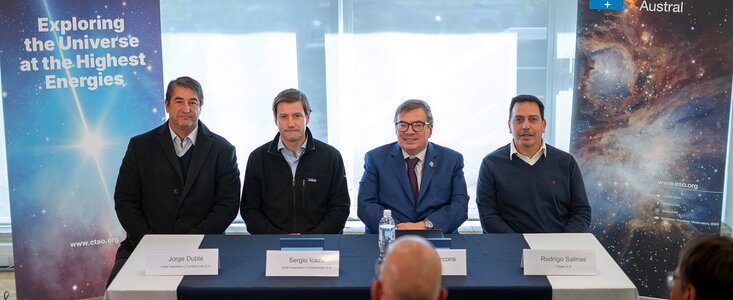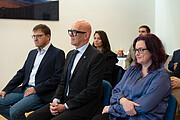Mitteilung
Vertrag für den Bau von Straßen und Teleskop-Fundamenten für das CTAO-Süd unterzeichnet
3. Juli 2025
Diese Woche wurde zwischen der ESO und einem Konsortium chilenischer Unternehmen ein bedeutender Vertrag im Wert von mehreren Millionen Euro für den Bau von Teleskop-Fundamenten für das Cherenkov Telescope Array Observatory (CTAO) auf der Südhalbkugel (CTAO-Süd) am Paranal-Observatorium der ESO in Chile unterzeichnet. Der Vertrag umfasst mehr als 50 Fundamente für die CTAO-Süd-Teleskope sowie etwa 17 km Straßen, die diese Fundamente mit den Nebeneinrichtungen verbinden. Die ESO, Gründungsmitglied des CTAO European Research Infrastructure Consortium und Betreiberin der südlichen CTAO-Anlage, unterzeichnete den Vertrag im Namen dieser internationalen Organisation. Der Bau dieser wichtigen zivilen Infrastruktur wird voraussichtlich ein Jahr dauern und den Weg für die Errichtung der ersten Teleskope vor Ort ebnen. Somit markiert dieser Meilenstein den Beginn des Baus des Arrays auf der Südhalbkugel.
CTAO wird das größte und leistungsstärkste bodengebundene Observatorium für Gammastrahlenastronomie sein. Es besteht aus zwei Teleskop-Anlagen: CTAO-Süd und CTAO-Nord auf der Kanareninsel La Palma in Spanien. Eine befindet sich auf der Südhalbkugel, die andere auf der Nordhalbkugel. Beide werden ein wachsames Auge auf eine schwer fassbare Strahlungsform namens Cherenkov-Strahlung haben. Wenn kosmische Gammastrahlung die Atmosphäre erreicht und mit ihr interagiert, wird eine Kaskade ultraschneller Teilchen erzeugt. Diese Teilchen einen schwachen blauen Lichtblitz, während sie sich durch die Luft bewegen, das sogenannte Cherenkov-Licht. Durch die Analyse dieses schwachen Lichts können Astronom*innen viel über die kosmischen Quellen wie supermassereiche Schwarze Löcher und Supernova-Überreste erfahren, die die ursprünglichen Gammastrahlen ausgesendet haben.
Der CTAO-Süd-Standort zur Erfassung von Cherenkov-Strahlung wird aus 51 Einzelteleskopen unterschiedlicher Größe bestehen, damit sowohl helle als auch schwache Ereignisse entdeckt werden. Der Standort wird eine Fläche von etwa drei Quadratkilometern umfassen und liegt etwa zehn Kilometer vom Cerro Paranal entfernt, dem Standort des Very Large Telescope der ESO. Nach seiner Fertigstellung wird CTAO Daten und Analysesoftware der gesamten globalen Wissenschaftsgemeinschaft öffentlich zugänglich machen. Das stärkt die weltweite Zusammenarbeit und trägt dazu bei, Fragen sowohl in der Astronomie als auch in der Teilchenphysik zu beantworten, wie etwa die Suche nach Dunkler Materie, die Mechanik von Supernovae und die Kollision dichter Neutronensterne.
CTAO wird das erste Observatorium seiner Art sein, das das hochenergetische Universum mit beispielloser Empfindlichkeit beobachten kann. Sein Standort in der Nähe des Cerro Paranal, fernab von Lichtverschmutzung und unter einem der dunkelsten und unberührtesten Nachthimmel der Welt, ist der Schlüssel zur Entdeckung des extrem schwachen blauen Cherenkov-Lichts.
Weitere Informationen
Im Januar 2025 wurde das CTAO von der Europäischen Kommission als Europäisches Forschungsinfrastrukturkonsortium (ERIC) gegründet. Gründungsmitglieder des CTAO ERIC sind Deutschland, die Europäische Südsternwarte (ESO), Frankreich, Italien, Österreich, Polen, Slowenien, Spanien und die Tschechische Republik. Japan ist strategischer Partner, und der Beitritt der Schweiz und Kroatiens als weitere Gründungsmitglieder ist derzeit in Arbeit.
Links
Kontaktinformationen
Bárbara Ferreira
ESO Media Manager
Garching bei München
Tel: 089 3200 6670
E-Mail: press@eso.org
Über die Mitteilung
| ID: | ann25005 |
Our use of Cookies
We use cookies that are essential for accessing our websites and using our services. We also use cookies to analyse, measure and improve our websites’ performance, to enable content sharing via social media and to display media content hosted on third-party platforms.
ESO Cookies Policy
The European Organisation for Astronomical Research in the Southern Hemisphere (ESO) is the pre-eminent intergovernmental science and technology organisation in astronomy. It carries out an ambitious programme focused on the design, construction and operation of powerful ground-based observing facilities for astronomy.
This Cookies Policy is intended to provide clarity by outlining the cookies used on the ESO public websites, their functions, the options you have for controlling them, and the ways you can contact us for additional details.
What are cookies?
Cookies are small pieces of data stored on your device by websites you visit. They serve various purposes, such as remembering login credentials and preferences and enhance your browsing experience.
Categories of cookies we use
Essential cookies (always active): These cookies are strictly necessary for the proper functioning of our website. Without these cookies, the website cannot operate correctly, and certain services, such as logging in or accessing secure areas, may not be available; because they are essential for the website’s operation, they cannot be disabled.
Functional Cookies: These cookies enhance your browsing experience by enabling additional features and personalization, such as remembering your preferences and settings. While not strictly necessary for the website to function, they improve usability and convenience; these cookies are only placed if you provide your consent.
Analytics cookies: These cookies collect information about how visitors interact with our website, such as which pages are visited most often and how users navigate the site. This data helps us improve website performance, optimize content, and enhance the user experience; these cookies are only placed if you provide your consent. We use the following analytics cookies.
Matomo Cookies:
This website uses Matomo (formerly Piwik), an open source software which enables the statistical analysis of website visits. Matomo uses cookies (text files) which are saved on your computer and which allow us to analyze how you use our website. The website user information generated by the cookies will only be saved on the servers of our IT Department. We use this information to analyze www.eso.org visits and to prepare reports on website activities. These data will not be disclosed to third parties.
On behalf of ESO, Matomo will use this information for the purpose of evaluating your use of the website, compiling reports on website activity and providing other services relating to website activity and internet usage.
Matomo cookies settings:
Additional Third-party cookies on ESO websites: some of our pages display content from external providers, e.g. YouTube.
Such third-party services are outside of ESO control and may, at any time, change their terms of service, use of cookies, etc.
YouTube: Some videos on the ESO website are embedded from ESO’s official YouTube channel. We have enabled YouTube’s privacy-enhanced mode, meaning that no cookies are set unless the user actively clicks on the video to play it. Additionally, in this mode, YouTube does not store any personally identifiable cookie data for embedded video playbacks. For more details, please refer to YouTube’s embedding videos information page.
Cookies can also be classified based on the following elements.
Regarding the domain, there are:
- First-party cookies, set by the website you are currently visiting. They are stored by the same domain that you are browsing and are used to enhance your experience on that site;
- Third-party cookies, set by a domain other than the one you are currently visiting.
As for their duration, cookies can be:
- Browser-session cookies, which are deleted when the user closes the browser;
- Stored cookies, which stay on the user's device for a predetermined period of time.
How to manage cookies
Cookie settings: You can modify your cookie choices for the ESO webpages at any time by clicking on the link Cookie settings at the bottom of any page.
In your browser: If you wish to delete cookies or instruct your browser to delete or block cookies by default, please visit the help pages of your browser:
Please be aware that if you delete or decline cookies, certain functionalities of our website may be not be available and your browsing experience may be affected.
You can set most browsers to prevent any cookies being placed on your device, but you may then have to manually adjust some preferences every time you visit a site/page. And some services and functionalities may not work properly at all (e.g. profile logging-in, shop check out).
Updates to the ESO Cookies Policy
The ESO Cookies Policy may be subject to future updates, which will be made available on this page.
Additional information
For any queries related to cookies, please contact: pdprATesoDOTorg.
As ESO public webpages are managed by our Department of Communication, your questions will be dealt with the support of the said Department.



